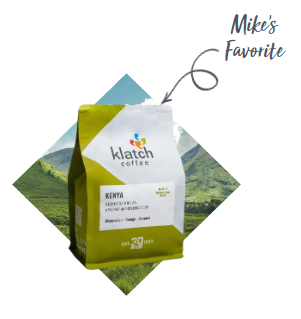
About this Coffee
Our Kenya Kirinyaga Kiri AA is a classic Kenyan coffee with a juicy mouthfeel and bright, earthy fruit flavors of watermelon, orange, and caramel. Bring vibrance to your summer mornings with our new Kenya.
Coffees from Kenya are very distinct – and by and large Mike Perry’s favorite. Known to be winey, savory, and vibrant, we love to showcase these coffees for what they are, truly unique. We specifically look for cup profiles that have clean, juicy, tropical acidity with high intensity of citric acidity, and full-bodied, coating sweetness. These coffees are sought after by many roasters, and we always find ourselves rushing to secure the best lot we can.
Kiri was established in 1997 and rests on a 5 acres piece of land serving Gitumbi, Kirunyuini, Kerere and Kaboia Villages. Currently it is affiliated to Ngiriambu Farmers Co-operative Society Ltd and it houses the society head office. Kiri Coffee Factory is located in Central Province, Kirinyaga County in Njukiini location of Gichugu Division near Kianyaga town. Its membership currently stands at 1400 which 1,200 are active farmers while 200 are inactive farmers.
The factory lies at an altitude of about 1,450mm above sea level in a region with red soil. The area experiences Moderate bimodal rainfall of about 1200mm p.a. with temperatures ranging between 13-25 degrees Celsius. The long rains fall between March-May while the short rains come between October and December.
The area experiences a biennial production cycle with the early harvest being from April-June and the late second season being from October-December. The main varieties of coffee grown are SL28, 34 and Ruiru 11, with SL28, 34 accounting to 99% of all coffee produced while Ruiru 11 accounts to 1 % of all production.
WASHED PROCESS:
After pulping, the coffee is fermented overnight to break down the sugars, before traveling through channels to the soaking tank where the coffee is carefully cleaned, soaked and spread out on the raised drying tables.Time on the drying tables depends on climate, ambient temperature and total production volume undergoing processing. Drying can take from 7 to 15 days in total. Continuous sorting and hand turning of the parchment takes place throughout the drying process.
SUSTAINABLE FARMING:
In line with the rising awareness on the need to conserve the environment, the factory has dug the waste water soak pits away from the water source where the waste water is allowed to soak in back to the soil. Currently the factory does not engage in waste water treatment. Additionally the society encourages its members to plant trees on their farms.
Kiri Coffee factory is run by a factory manager who oversees all activities within the factory. Together with other staff members they carry out duties such as weighing coffee, selection and grading of coffee, paying farmers and addressing farmers’ complaints.
The affiliate members of the factory carry out all agronomic activities associated with coffee production i.e. they source coffee from the Coffee Research Station and plant it according to the stipulated guidelines. Fieldwork carried out involves weeding, pruning, spraying, and application of fertilizer, mulching and technical advice.
Technical advice is offered through farmer training programs and field visits/days offered by ministry of agriculture. Compliance to the agreed guidelines is checked and supervised by the field committee which goes round the farms. They usually check that coffee is not inter-grown with other crops such as maize and Beans, though they do allow intercropping with Macadamia.